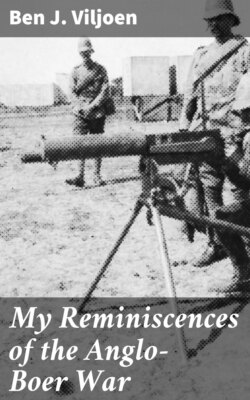Читать книгу My Reminiscences of the Anglo-Boer War - Ben J. Viljoen - Страница 7
На сайте Литреса книга снята с продажи.
CHAPTER I.
ОглавлениеTable of Contents
THE WAR CLOUDS GATHER.
In 1895 the political clouds gathered thickly and grew threatening. They were unmistakable in their portent. War was meant, and we heard the martial thunder rumbling over our heads.
The storm broke in the shape of an invasion from Rhodesia on our Western frontiers, a raid planned by soldiers of a friendly power.
However one may endeavour to argue the chief cause of the South African war to other issues, it remains an irrebuttable fact that the Jameson Raid was primarily responsible for the hostilities which eventually took place between Great Britain and the Boer Republics.
Mr. Rhodes, the sponsor and deus ex machinâ of the Raid, could not agree with Mr. Paul Kruger, and had failed in his efforts to establish friendly relations with him. Mr. Kruger, quite as stubborn and ambitious as Mr. Rhodes, placed no faith in the latter's amiable proposals, and the result was that fierce hatred was engendered between the two Gideons, a racial rancour spreading to fanatical lengths.
Dr. Jameson's stupid raid is now a matter of history; but from that fateful New Year's Day of 1896 we Boers date the terrible trials and sufferings to which our poor country has been exposed. To that mischievous incident, indeed, we directly trace the struggle now terminated.
This invasion, which was synchronous with an armed rebellion at Johannesburg, was followed by the arrest and imprisonment of the so-called gold magnates of the Witwatersrand. Whether these exceedingly wealthy but extremely degenerate sons of Albion and Germania deserved the death sentence pronounced upon their leaders at Pretoria for high treason it is not for me to judge.
I do recall, however, what an appeal for mercy there went up, how piteously the Transvaal Government was petitioned and supplicated, and finally moved "to forgive and forget." The same faction who now press so obdurately for "no mercy" upon the Colonial Afrikanders who joined us, then supplicated all the Boer gods for forgiveness.
Meantime the Republic was plagued by the rinderpest scourge, which wrought untold havoc throughout the country. This scourge was preceded by the dynamite disaster at Vrededorp (near Johannesburg) and the railway disaster at Glencoe in Natal. It was succeeded by a smallpox epidemic, which, in spite of medical efforts, grew from sporadic to epidemic and visited all classes of the Rand, exacting victims wherever it travelled. During the same period difficulties occurred in Swaziland necessitating the despatch of a strong commando to the disaffected district and the maintenance of a garrison at Bremersdorp. The following year hostilities were commenced against the Magato tribe in the north of the Republic.
After an expensive expedition, lasting six months, the rebellion was quelled. There was little doubt that the administration of unfaithful native commissioners was in part responsible for the difficulties, but there is less doubt that external influences also contributed to the rebellion. This is not the time, however, to tear open old wounds.
Mr. Rhodes has disappeared from the stage for ever; he died as he had lived. His relentless enemy Mr. Kruger, who was pulling the strings at the other end, is still alive. Perhaps the old man may be spared to see the end of the bloody drama; it was undoubtedly he and Mr. Rhodes who played the leading parts in the prologue.
Which of these two "Big Men" took the greatest share in bringing about the Disaster which has drenched South Africa with blood and draped it in mourning, it would be improper for me at this period to suggest. Mr. Rhodes has been summoned before a Higher Tribunal; Mr. Kruger has still to come up for judgment before the people whose fate, and very existence as a nation, are, at the time of writing, wavering in the balance.
We have been at one another's throats, and for this we have to thank our "statesmen." It is to be hoped that our leaders of the future will attach more value to human lives, and that Boer and Briton will be enabled to live amicably side by side.
A calm and statesmanlike government by men free from ambition and racial rancour, by men of unblemished reputation, will be the only means of pacifying South Africa and keeping South Africa pacified.[Back to Table of Contents]
